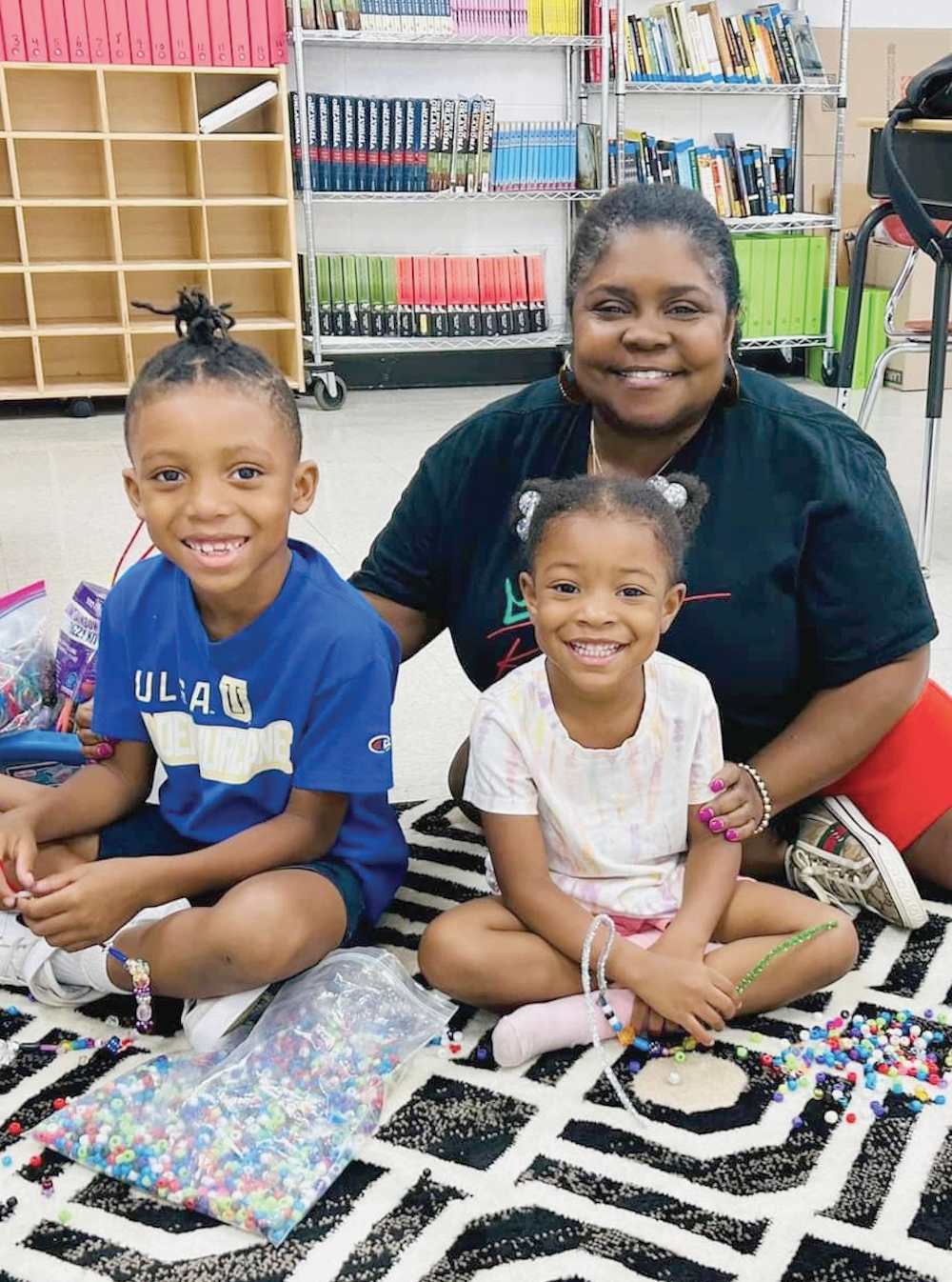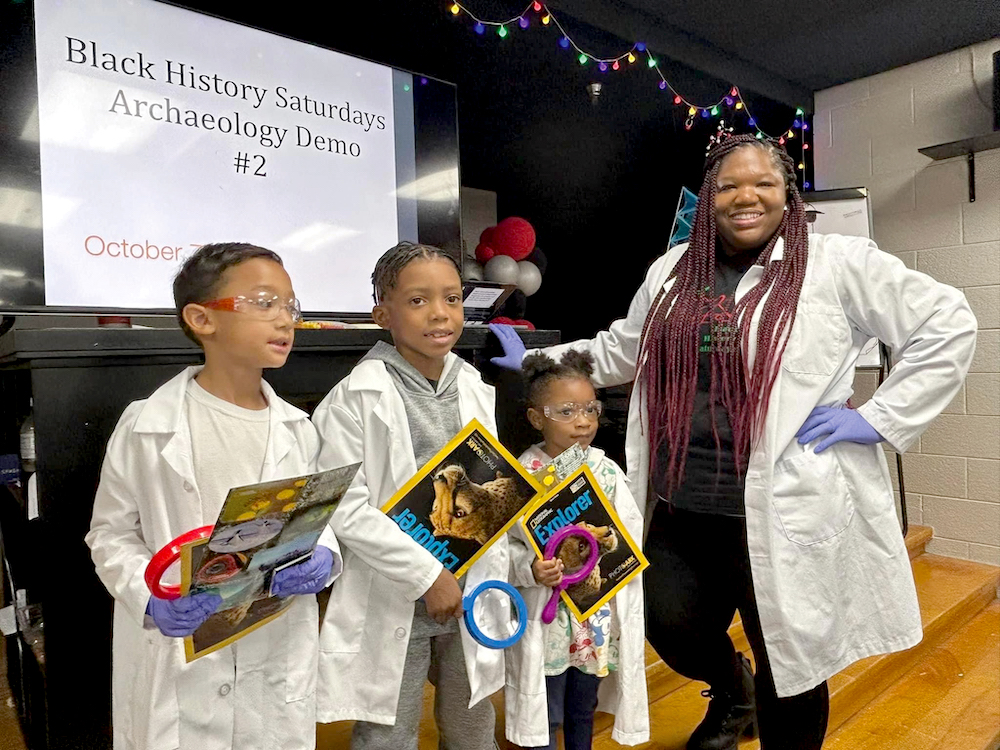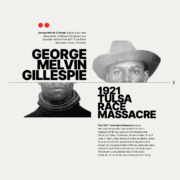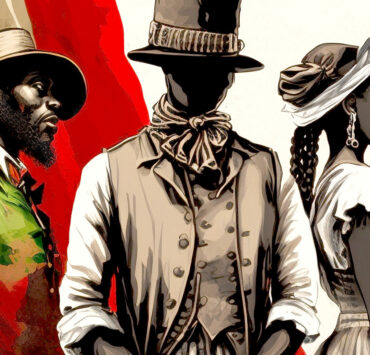
EDUCATION
Tulsa’s Black Community Reclaims Its Legacy
Gary Lee
Featured Image. Kristi Williams, founder, Black History Saturdays, shares a playful moment with two young pupils in a break between classes. Credit. Kristi Williams
Dozens of students had just completed classes at Black History Saturdays (BHS) in north Tulsa, and several of them rose, one by one, to share what stood out in the lessons they had taken during the day.
“We discovered that when the Tulsa Race Massacre occurred, other states and countries were discouraged from helping the victims,” one Black adolescent female told the other students and teachers. A second young Black student said she, too, was struck by a new revelation about the 1921 incident. The story goes that a white mob initiated the violence after Dick Rowland, a Black shoeshine attendant, flirted with Sara Page, a white female elevator operator.
“We knew that the two of them knew one another, “the student said. “But we learned that they knew one another quite well,” she added. A third participant, an instructor, recounted that the rich history of Creek Freedman – dating back to well before Oklahoma became a state – provided a memorable lesson.
This poignant ritual, in which students recount the high points of the day’s lessons, is a regular feature of a powerful educational experience in north Tulsa.
Black History Saturdays is a program that brings Tulsans together for one day a month for lectures and discussions in various aspects of Tulsa, U.S., and international Black History and culture.
Following a successful first run of classes in 2023, the program is set to start its second-year season in February 2024. More than 200 adults and school kids have signed up – at least a third more than in the first round.

Understanding Our Ancestors
One of the biggest attractions of Black History Saturdays is that at its core it is about a community – the Black people of Tulsa – reclaiming its past. “What we are doing is creating a space for our people to learn about the events that impacted the lives of those who came before us,” said Williams.
“By understanding our ancestors, we can make better decisions. And eventually, we will become better ancestors.”
She explained the program’s mission more thoroughly. It is “to educate young people, their families, and the wider community towards a more honest and comprehensive understanding of Black history in Oklahoma and across the globe.”
Some teachers who are engaging in BHS view it as a revival of Black community tradition rather than a new concept.
“Black people teaching Black people about our past is not a new concept,” said Michael Carter, a BHS instructor and principal of the KIPP OKC (Oklahoma City) College Prep.
“It’s part of our tradition, a part of Old School Black community culture. But we’ve lost it for various reasons. With Black History Saturdays, we’re recapturing that tradition.”
Williams concurs. She recalls that Richard Roundtree, a former social studies teacher at Memorial High School, offered her and other students lessons in Black history that have stayed with her over the years.
“He taught that our legacy did not begin with slavery and so many other things,” she explained. “I have never met a teacher more excited about teaching Black history,” she added. “He’s a big part of the inspiration for Black History Saturdays.”
The dark, bloody history that Tulsa experienced during the 1921 Race Massacre and the successful attempts to cover up that event emphasizes how crucial it is for Black Tulsans to have a firm grounding in the historical events that shaped us, Williams added.
A Cadre of Experienced Teachers
The BHS classes are held the first Saturday of every month at the Edurec Youth and Family Fun Center, 5424 N. Madison Ave., in a predominantly Black sector of north Tulsa. There are around a dozen instructors, most of whom are professional teachers from Tulsa, Oklahoma City, or elsewhere in Oklahoma. Some, like Williams, are well-known figures in Tulsa’s Black community. For instance, Tulsa Community College English professor Dewayne Dickens teaches ninth to 12th graders. City Councilor Vanessa Hall-Harper and Tri-City Collective founder and poet Quraysh Ali Lansana teach adults.
The subject matter ranges wide. The first few sessions are usually focuses on different aspects of the history of various African countries. As the school year unfolds, from the ongoing narrative of the mass graves of race massacre victims to the documentation of slavery in the U.S. and the Caribbean. Dr. Alicia Odewale, a nationally known archeologist, offers a class in archaeology via Zoom. This year an instructor will offer all students piano lessons.
As important as the subject matter of the classes is the vibe that Williams and the other leaders create. The classes are held in various rooms in the Edu Center. Lectures about Tulsa’s tortured racial past ring out from one room. A talk about U.S. enslavers takes place in another. The atmosphere of Black people teaching Black students about the achievements and legacies of the forebearers makes for a palpable, positive aura.
Carter, the BHS instructor, said the popularity of the course buoyed him and other organizers.
“We learned that if you give people a platform and venue to share information about their past, people will come and partake in it,” he explained in an interview with The Oklahoma Eagle. Carter says he and others are pursuing the possibility of offering Black History Saturdays in other cities.
Teaching People to Care About Black History
Black History Saturdays is the fruition of a dream that Williams harbored for years. Former chair of the Greater Tulsa Area African American Affairs Commission and a descendant of victims of the 1921 Tulsa Race Massacre, Williams has forged a career of advocating for the betterment of Black Tulsans.
“Of course, the objective of the course is to teach people Black history,” Williams said in an interview with The Oklahoma Eagle. “But my mission goes much further than that. I want to teach our people to care about Black history.”
Williams created BHS in part as an act of defiance. She decided to launch the class after the GOP-dominated Oklahoma state legislature passed Oklahoma HB 1775 in 2021. The statute restricted how race and gender could be taught in Oklahoma’s public schools. The state of Oklahoma, in HB 1775, banned teaching certain concepts around race and gender.
After the passage of HB 1775, teachers in Tulsa Public Schools and other school districts across Oklahoma began to self-censure their teachings. Many reported stepping back from classroom discussions on the themes of the history of Blacks for fear that students or parents would single them out and be criticized. Several teachers Williams initially asked to participate in BHS declined under worries that being part of the program would cost them their jobs.
“I had been thinking about organizing the classes for a long time,” Williams said. “But the attempts to restrict what Black students should know about their past made it clear that something had to be done. We had to create a space to educate our people about our past.
Support From at Home and Afar
Many supporters, including educators in Tulsa and nationwide, parents, and students, have embraced Black History Saturdays wholeheartedly. National Geographic, an early supporter, is offering financial backing. The corporate giant General Mills and the social initiative 2892 Miles To Go (a National Geographic affiliate) are also among the sponsors. The funding, Williams says, goes to administrative costs, including paying teachers, providing meals, and administrative work.
BHS has also garnered media attention from across the U.S. National Public Radio (NPR), the OWN network, and other national news outlets, which have featured the history series in broadcasts.
Many adult students engaged with BHS are ecstatic about the classes.
Peggy Marbury, a north Tulsa grandmother, is one. Marbury hailed the course as “an incredible wealth of information about Black people and our culture.”
“The most important thing I have learned is how many things I did not know about Black history.”
Margaret Love, a retired teacher at Langston University, is another loyal BHS student. For her, one standout feature in the classes was the lesson about Black inventors, from George Washington Carver (inventor of the cotton gin and other tools) to Benjamin Banneker (who created an effective system of clocks.
“Black people have invented so many things that have been taken away from us,” she told The Oklahoma Eagle.
For Carter, the instructor, that moment when students share the high points of the day’s lessons is one of the most touching aspects of the Black History Saturdays experience. “It’s kids teaching adults and vica versa, he said. “It’s the community educating itself. It’s very uplifting.”
Tulsans interested in signing up for Black History Saturdays can do so here.










